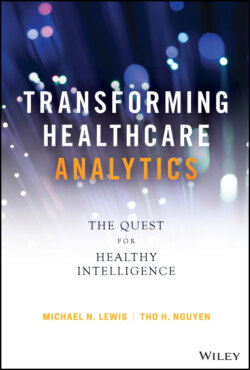Читать книгу Transforming Healthcare Analytics - Michael N. Lewis - Страница 17
HEALTH TECHNOLOGY
ОглавлениеIn every direction you turn, technology has played an important role and it has an enormous impact on how healthcare has evolved over the last decades. Health technology is defined by the World Health Organization as the “application of organized knowledge and skills in the form of devices, medicines, vaccines, procedures and systems developed to solve a health problem and improve quality of lives.” The simple fact is that, as technology advances, many new innovations are created and developed every day. We believe technology has changed healthcare dramatically and patients, clinicians, researchers, practitioners, and healthcare professionals are reaping the benefits. Think about all of the technology that healthcare uses on a daily basis. For example, computerized tomography (CT) scan machines take x-rays of our bodies from multiple angles and clinicians can examine the x-rays in near real-time to diagnose our symptoms. These images can be stored and shared simultaneously to other doctors as needed. You can even carry x-rays with you if you desire to have them read by another doctor or practice. This is something that we take for granted now but it is such an important piece of technology that is used every day by clinicians.
Other advancements, such as surgical technology, breathing apparatuses, and technologies that deliver and administer medicine have improved and are helping to save people's lives. It's not just the equipment that has changed. Take, for example, the administration of anesthesia. Decades ago, when patients needed to numb pain, they either had no anesthesia or had to be put under completely. Today, clinicians can administer anesthesia locally or to a certain area and patients are more comfortable because they will not feel the pain when having a minor operation.
The biggest change that technology is able to deliver is the way healthcare professionals communicate. Long gone are the days where doctors can only be reached via a beeper. When a doctor was beeped, that clinician would need to find a phone to call that number. Now, however, hospital staff can communicate with one another more effectively and update each other in near real time. We have personally witnessed the use of speech to text when nurses or doctors are documenting their patients. In addition, speech commands can be used to call a specialist or doctor without having to pick up a mobile phone. It is similar to using a cloud-based voice service like Alexa, Siri, or Cortana. Nurses and doctors can simply use speech commands such as “Call Dr. Smith” or “Is Nurse Jo available to come to room 311?”
In addition to calling and connecting clinicians, the advancement of technology also allows medical records to be stored electronically. Compared to a few decades ago, when most medical records were still stored physically in cabinets with thousands of notes spilling out, these electronic records can all be aggregated in a safer and more secure environment for future use. There is less of a chance that information can be misplaced or lost since medical records are now stored electronically. Other ways technology has played a role include hospital booking systems, helping the staff to be better organized and better manage the workload of staffing. A more structured and organized environment leads to better healthcare from hospitals and clinicians know what they have to do with minimal disruptions.
Technology changes how we all live and work but we believe it has improved and benefited the healthcare industry the most. Compared to a few decades ago, we are seeing more tablets, mobile devices, and digital monitoring systems being used to improve lives. Lives are being saved every day because of the progress made in technology for healthcare.
